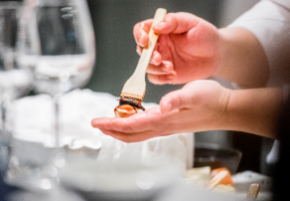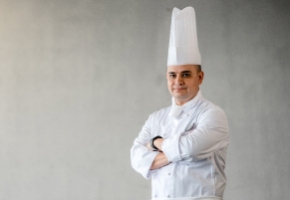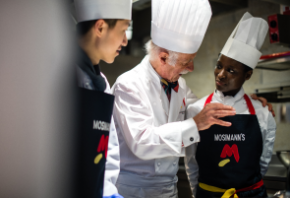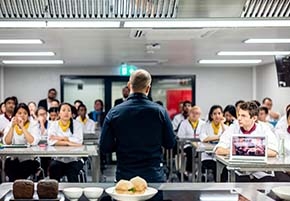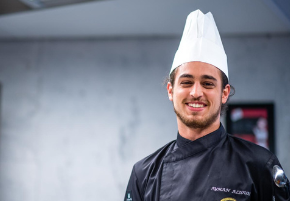- About
- Programs
- Campus Life
- Career Services
- Admissions
- News & Events
- Alumni
Culinary Careers: 25 Unique Paths in the Food World
Interested in food? Discover 25 innovative culinary careers that offer creativity, travel, leadership, and more. Start your flavorful journey now.
Key Takeaways
- Culinary careers go far beyond the kitchen, offering exciting paths in business, travel, education, and media.
- Some chefs and food professionals eventually become entrepreneurs, launching restaurants, product lines, or digital platforms.
- Schools like Culinary Arts Academy Switzerland connect students with global opportunities through real-world experience and industry networking.
The culinary world is constantly evolving, blending creativity, culture, and innovation in ways that extend far beyond the walls of a restaurant kitchen. While many still picture chefs in white coats behind stoves, the reality is much broader. Culinary careers now span business, media, education, travel, and even science.
From styling food for photo shoots to using cuisine as a tool for international diplomacy, the industry opens doors for those who want to pair a passion for food with other interests.
25 Innovative Culinary Careers
Start Your Culinary Journey
Learn the art of cooking in a world-class environment
The culinary world offers more variety than ever before, blending tradition and modern twists together for the ultimate dream job. Today's roles can align with personal values, creative interests, and lifestyle goals. You might discover a career that lets you stay hands-on in the kitchen or one that channels your passion for food into a completely different field.
Hotel or restaurant chef
Wearing both a chef's coat and a leader's hat, these professionals craft menus, mentor kitchen teams, and oversee daily service. Becoming a chef typically begins with culinary school or apprenticeships, and involves earning certifications such as ServSafe or its equivalent. As experience grows, chefs progress from line cook to sous chef and eventually to executive chef or culinary director, often taking creative control or opening restaurants of their own.
Food blogger
A food blogger merges storytelling, photography, and recipe development into a single role. While formal training may range from cooking classes to digital marketing programs, most credibility stems from producing consistent, high-quality content.
Ambitious bloggers can grow into influencers, launch cookbooks, or collaborate with brands, turning passion into income through ads, sponsorships, and affiliate links. Take Gordon Ramsay, for example, who, beyond being a chef and restaurateur, has also created a massive following online and through his cookbooks.
Catering chef
This role relies heavily on logistics and creativity, encompassing menu planning, budgeting, and staff coordination for events such as weddings, fundraisers, and corporate gatherings. Many caterers establish their credentials through hospitality coursework and hands-on event experience.
Growth opportunities include scaling operations, launching specialized services (like vegan or cultural menus), or franchising regionally. The catering market size is promising, with projections estimating the market to reach USD 229.92 billion (€213.5 billion) by 2033.
Culinary instructor
For those who enjoy guiding others, culinary instruction offers the chance to shape both skills and confidence in aspiring chefs. They help turn raw passion into refined technique through hands-on teaching and mentorship.
Instructors typically hold formal credentials from a culinary school, as well as teaching certifications. Some pursue additional training in education theory or earn a teaching license. Career advancement can lead to head instructor roles, curriculum development, or the opening of private cooking schools.
Food and beverage director
Overseeing the entire guest dining experience, these leaders manage menus, wine lists, staffing, budgets, and vendor relationships. Degrees in hospitality or business, along with certifications such as WSET (Wine & Spirit Education Trust) or CHA (Certified Hotel Administrator), are common. Successful directors may advance to regional leadership, consulting roles, or executive positions within hotel chains or resorts.
Grocery store manager
Though behind the scenes, this role is critical to ensuring product quality, smooth logistics, vendor coordination, and customer satisfaction. Training often involves retail or hospitality management diplomas.
With experience, managers can step into district or regional leadership, develop private-label lines, or transition into wholesale and food distribution.
Quality control manager
These specialists ensure that food products meet safety, taste, and consistency standards. Degrees in food science or microbiology are typical, along with HACCP certification. This role also requires being up-to-date with the latest trends shaping food science and technology, including sustainable food production, AI and automation, and the rise of personalized nutrition.
Quality control managers can advance to food safety director roles, consultant work, or leadership in food manufacturing.
Restaurant owner
Restaurant owners take full creative and financial responsibility for their establishments. They oversee everything from menu concept and branding to location, staffing, and financials. Most cultivate business acumen through hospitality diplomas and mentorships, and test concepts via pop-ups or food trucks.
Former CAAS student, now a successful restaurant owner, Chef Tom Cariano believes that your restaurant should reflect your unique persona. This can be key to ensuring your restaurant stands out from the crowd. Expansion may include opening multiple locations or franchising.
Gastro-diplomacy
This niche field uses food to build international relationships and promote cultural understanding. Professionals often combine cooking credentials with studies in international relations or cultural diplomacy. Work can involve coordinating embassy dinners, running culinary workshops abroad, or managing cultural exchange initiatives.
For example, a chef might collaborate with an embassy to host a regional tasting event for foreign diplomats, showcasing national dishes to spark conversation and cultural understanding. Others might lead cooking workshops abroad, using cuisine as a tool for cross-cultural dialogue and connection.
In-flight chef
High-altitude cuisine isn't easy; meals must survive pressure, temperature, and storage constraints. This is what in-flight chefs excel in. For this role, specialized airline training programs and aviation food safety certifications are often required. Flying Chef Eren Berker explains:
As a Flying Chef, I am part of the airline crew and responsible for the perfect product presentation in the business class and the culinary assistance of the flight attendants… We prepare all the meals in the galley and serve passengers in the cabin.
Career growth may extend to roles such as catering management, airline menu consulting, or executive positions in airline hospitality services.
Pastry chef
Masters of sugar, butter, and precision, pastry chefs craft desserts, pastries, and baked goods. Training often comes from pastry-specific programs or apprenticeships, while certifications, such as Certified Pastry Culinarian, add credibility. Culinary Arts Academy Switzerland offers the Swiss Diploma in Pastry Arts program, where you get practical training to learn key dessert skills and make both traditional and modern Swiss and European sweets. Ideal for career changers and those looking to gain comprehensive skills.
Dominique Ansel, Pierre Hermé, and Christina Tosi are some of the most famous pastry chefs who are leading the way for culinary excellence. As a pastry chef, you can open your own bakery, teach, or compete in pastry competitions.
Personal chef
Tailoring meals to specific clients, personal chefs often work for families, athletes, or high-profile clients who expect quality, privacy, and customization. As reputation builds, so do referrals, and some even publish cookbooks or create exclusive meal services for niche markets.
Alfredo Garcia is a prime example, who started his career as a private chef for baseball players in South Texas and turned his kitchen creativity into a cookbook, Let's Make It: A Mexican American Culinary Adventure.
Nutritionist
By combining culinary knowledge with health sciences, nutritionists design meal plans for individuals, schools, or healthcare facilities. A degree in nutrition or dietetics, along with professional licensing, is required. Many begin in clinical roles and then specialize in sports nutrition, wellness coaching, or food consulting.
With the evolution of personalized nutrition and as more people are seeking a healthier lifestyle, this role offers promising job prospects.
Food consultant
Food consultants help restaurants, brands, and media companies refine recipes, launch menus, or solve operational issues. Chefs or food scientists often transition into consulting after years of experience.
Independent experts can scale into agencies, work with retail chains, or join food-tech startups.
Food product developer
Creating the foods found on supermarket shelves requires blending culinary creativity with food science. This is at the core of food product development. Examples of their work may include a plant-based frozen entrée or a snack with an extended shelf life.
A degree in food science, experience in R&D (Research and Development), and knowledge of regulations are essential for the role. Growth opportunities include leading innovation teams or starting new food ventures.
Food critic or writer
Becoming a food critic demands keen sensory skills, excellent writing, and cultural awareness. While there are typically no educational requirements for this role, many build their career through journalism degrees or self-publishing.
However, a culinary degree can also set you apart by exposing you to the world of restaurants and dining. Some take an alternative approach to this role by sharing their expertise on social media, like Keith Lee, who's gained over 17 million followers by posting his food reviews online. Some go on to write for major outlets, secure book deals, or host food shows.
Sommelier
Sommeliers are experts in wine pairing. They often start their career with foundational restaurant experience, then earn certifications like WSET (Wine & Spirit Education Trust) or the Court of Master Sommeliers. They advise diners and staff while managing wine cellars. CAAS student Zachary Tey defines success as a sommelier, saying:
Wine to me is an ingredient that completes a dining experience. Food and wine on their own as individual elements are great, but the magic happens when they come together.
Top sommeliers can become wine directors, lecture internationally, or launch wine import companies.
Food safety inspector
Food safety inspectors ensure that food outlets comply with hygiene and safety standards. Degrees in microbiology, public health, or related fields, plus government certification, are typically required. Career moves include positions in governmental agencies, consulting firms, or corporate compliance teams.
Food manufacturing
This broad field includes roles in production, supply chain, and plant management. Training varies from culinary school to engineering degrees. Workers may start on the factory floor, rising into quality assurance (QA), operations management, or innovation.
Food manufacturing is ideal for those who enjoy problem-solving, large-scale systems, and improving how food gets safely and efficiently to shelves worldwide.
Food stylist
Food stylists are creative professionals who make food look stunning for photos, videos, or packaging. They can work on ad campaigns, cookbooks, packaging, and social media. Many come from culinary school and add visual arts or photography training.
Growth in this profession can lead to agency work, brand consulting, or media production leadership.
Kitchen equipment sales
This career combines knowledge of kitchen operations with sales expertise. It's a strong fit for those who enjoy food but thrive in client-facing roles, offering the chance to influence how professional kitchens are built and equipped.
Often, industry veterans or culinary school grads join manufacturers or distributors. Top performers become regional managers, client trainers, or even fund startups for new culinary tools.
Research chef
A hybrid of chef and scientist, a research chef innovates new flavors and textures, often for large food companies. Programs in culinary arts and food science are common for the role. Becoming a research chef suits curious minds who enjoy experimenting with ingredients, improving shelf stability, or creating plant-based alternatives that align with evolving consumer trends.
Career growth can lead to R&D leadership, patenting products, or even spinning off startups with novel culinary tech.
Food service manager
Overseeing operations in cafeterias, schools, hospitals, or corporate facilities, these managers balance logistics, staffing, and budgets. For example, a food service manager in a hospital ensures that hundreds of meals meet strict dietary guidelines daily while staying on budget and managing staff schedules.
Hospitality or business degrees are often required, whereas further advancement may lead to corporate roles or national-level administration for large institutions.
Hospitality manager
A hospitality manager is someone who makes sure everything runs smoothly across restaurants, hotels, or resorts, from front-of-house service to back-end logistics. A degree in hospitality management is often the foundation, but practical experience in customer-facing roles is what really sharpens instincts.
Many go on to become regional directors, consultants, or senior executives in hospitality groups.
Culinary tour guide
For those who love storytelling and food culture, this role involves guiding travelers through food markets, restaurants, and local traditions. Strong public speaking, cultural knowledge, and language skills are essential.
Culinary heritage is at the heart of the job—something Culinary Arts Academy Switzerland recognizes through the Anton Mosimann Award, celebrating excellence in culinary heritage research. Many guides eventually launch their own food-focused travel companies or design curated international experiences.
Why Choose a Culinary Career?
A culinary career goes far beyond the kitchen. It's a chance to express creativity, explore global cultures, and build a fulfilling path that fits your interests and personality. From artistic roles such as pastry design and food styling to strategic jobs in the food industry, education, or media, the culinary world offers something for everyone. It attracts travelers, innovators, leaders, and skilled creators.
The industry's stability, even during global shifts, makes it a strong long-term choice. Many chefs and food professionals eventually become entrepreneurs, launching restaurants, product lines, or digital platforms. Job satisfaction often comes from seeing your work immediately enjoyed and appreciated, something few careers offer so directly.
At Culinary Arts Academy Switzerland, our Bachelor of Arts in Culinary Arts teaches you essential chef skills and how to start your own food business. Our Master of Arts in Culinary Business Management builds your management skills, helps you create food concepts and recipe books, and prepares you to develop a strong business plan to lead in the culinary world. Both programs blend hands-on training with real-world business knowledge, preparing you for a variety of careers in the food industry.
Through the International Recruitment Forum, on the other hand, our students connect with top employers worldwide, securing internships and launching global careers. Whether you're driven by flavor, hospitality, education, or innovation, a culinary career can take you far, both literally and professionally.
Craft a Rewarding Career in Culinary Arts
The culinary world offers a wide range of possibilities, from teaching and travel to innovation, leadership, and entrepreneurship. You might thrive on the energy of a kitchen, feel intrigued by the business side of food, or be inspired by opportunities that involve cultural exchange.
Your next step could be enrolling in a culinary program, applying for an internship, or pursuing a certification that helps you grow your skills and move closer to your goals.
At Culinary Arts Academy Switzerland, students gain practical experience, an international perspective, and access to global career pathways. Your future in food could start with the right training and a bold first move!
Frequently Asked Questions (FAQs)
What are some common entry-level careers in the culinary industry?
Popular starting roles include line cook, prep cook, kitchen assistant, catering staff, and pastry assistant. These positions help build foundational skills and experience.
What education or training is required for careers in the culinary industry?
While many roles offer on-the-job training, attending a culinary school, completing an apprenticeship, or earning certifications can accelerate career growth and expand your opportunities.
Is a career in culinary arts worth pursuing?
Yes! For those who are passionate about food, creativity, and hands-on work, the culinary field offers a fulfilling career with a wide range of possibilities and strong long-term potential.
Interested in becoming a world-class chef? Learn more about Culinary Arts Academy Switzerland. Download our brochure.


